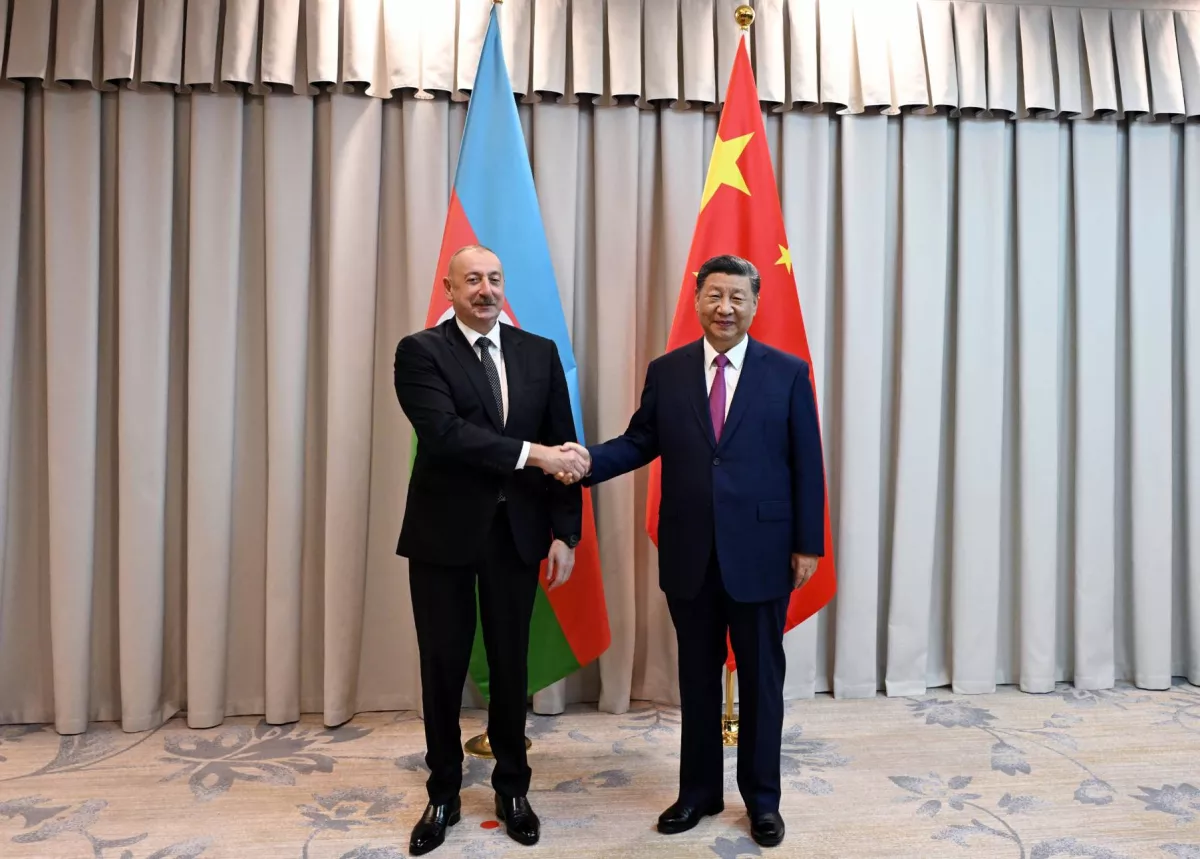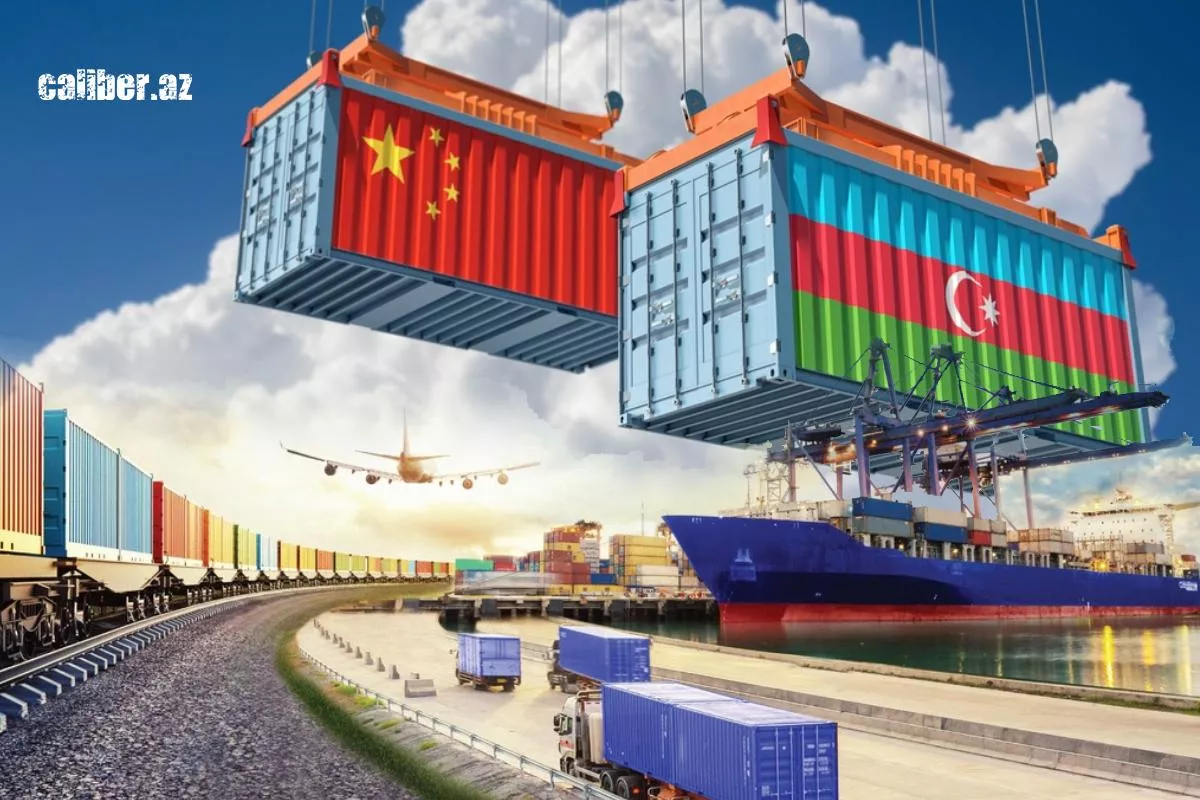Baku – Beijing: From trade to high-tech cooperation Caliber.Az review
The longstanding friendly relations between Azerbaijan and China have evolved in recent years into a strategic partnership rooted in mutual respect for sovereignty, territorial integrity, and support on international platforms. Building on this foundation, Beijing and Baku are accelerating their trade and economic ties, implementing joint initiatives in industry, transportation, IT technologies, and green energy. These trends were particularly notable in 2023, when bilateral trade increased by 44%. According to recently published statistics, comparable volumes of Azerbaijan-China trade were recorded in the January-October period of the current year.
Azerbaijan is the largest trading partner of China in the South Caucasus region, accounting for nearly 45% of all regional trade with the Asian powerhouse. In the post-pandemic period, Azerbaijan-China trade and economic ties have recovered rapidly, surpassing pre-crisis levels. By the end of last year, these mutually beneficial and promising business relations had elevated China to the fourth position among Azerbaijan's foreign trade partners and second among importing countries.
In 2023, the two nations achieved a remarkable 44% increase in trade, reaching a record $3.1 billion. While the bulk of trade traditionally consists of a wide range of Chinese-made products, Azerbaijani exports to the Chinese market also saw a notable 40% growth last year.
These positive trends have largely continued into the current year. According to Azerbaijan’s State Customs Committee (SCC), trade turnover between Azerbaijan and China exceeded $3.015 billion from January to October 2024, marking an increase of more than $441 million compared to the same period last year. Overall, bilateral trade grew by 17.14% over ten months, driven primarily by a 20.01% annual increase in imports of Chinese goods.
Unfortunately, Azerbaijani exports to China remain relatively modest. They are dominated by products like petroleum coke, aviation kerosene, primary polyethylene, and other petrochemical goods. Azerbaijani exporters also supply food products, wine, cotton fibre, perfumes, and various industrial equipment and components manufactured in the country’s industrial clusters.
To expand the presence of non-oil products under the "Made in Azerbaijan" brand in China’s vast market, Azerbaijan's Export and Investment Promotion Agency (AZPROMO) has established an extensive network of trade and wine houses in China. Azerbaijani trade houses are operational in Qingdao, Chengdu, Xi'an, and Zhangjiajie, with a new addition in Nanjing as of May 2024. Additionally, trade house branches operate in Shanghai, Harbin, Jinan, and Wuhan, alongside three wine houses located in Urumqi and Shanghai.
Recently, Baku and Beijing have been consistently diversifying their economic ties, with a particular focus on joint initiatives in industry, transportation, high technologies, and green energy. These trends reflect qualitative changes in Azerbaijan-China relations, which have been elevated to a strategic level. For instance, during the Shanghai Cooperation Organization (SCO) summit held in Astana on July 3, 2024, a joint Azerbaijan-China declaration on establishing a strategic partnership was adopted. According to the document, "the two countries agreed to expand cooperation in political, economic, and cultural fields."

Over the past years, Azerbaijan has invested around $1.7 billion in China's economy, while Chinese investments in Azerbaijani projects exceed $800 million. Currently, approximately 275 companies with Chinese capital are registered in Azerbaijan. These trends have significantly intensified in recent times, with a positive shift observed in Azerbaijan-China relations, particularly in the areas of investments and the establishment of joint ventures (JVs).
Recently, a resident company of the Sumgayit Chemical Industrial Park (SCIP), Azerbaijan Vanhong Ceramics Co., a company with Chinese capital, began producing core ceramic tiles (non-slip porcelain tiles) with the prospect of exporting them to post-Soviet countries. Additionally, a framework agreement was recently signed with the Chinese company BYD Company Limited for the purchase of electric buses, the localization of their assembly in Azerbaijan, and the creation of charging and service infrastructure. Over time, the agreement with BYD plans to establish production of electric freight and municipal vehicles, with battery assembly for energy storage expected to begin in 2028.
In the future, Baku and Beijing plan to implement green energy projects with a total capacity of 2 GW. A significant milestone in this regard was the visit of Azerbaijan's Minister of Energy, Parviz Shahbazov, to China in late October, where he participated in the third "Belt and Road" Energy Ministers' Conference. During the visit, the minister held bilateral meetings with leaders of major Chinese companies in the field of renewable energy (RE), aiming to attract know-how, technologies, and investments in the green energy sector.
Particular discussions focused on integrating additional RE capacities into Azerbaijan's energy system, implementing offshore wind energy projects in the Caspian Sea, localizing the production of RE sector equipment in Azerbaijan, cooperation in green energy corridors, and involving Chinese companies in the construction of a solar power plant in Fuzuli with a total capacity of 160 MW.
However, the most promising direction in Azerbaijan-China business relations appears to be cooperation in the transportation and logistics sector. Today, it can be confidently stated that China is a key partner for Azerbaijan, particularly in expanding the potential of the Middle Corridor. Since the launch of the first China Railway Express container train in 2019, Chinese container multimodal transit has significantly expanded in terms of cargo types and the geography of cities in China from which block trains are formed.
Since April 2022, China has begun sending freight trains from Xi'an, transiting through Kazakhstan, Azerbaijan, Georgia, Romania, Hungary, Slovakia, and the Czech Republic to Germany. Container block trains formed in China, using the Trans-Caspian route, are on the move for approximately 20-25 days, which is half the time compared to sea transport through the Suez Canal, which typically takes 40-50 days. These developments strengthen Baku’s role within China’s Belt and Road Initiative, reinforcing the bilateral strategic partnership.
"Today, Azerbaijan Railways and its partners in China are negotiating the possibility of increasing the number of rail routes to Europe, which will provide an additional opportunity for Chinese freight carriers to enter the European market," said Emil Mamedov, advisor to the chairman of Azerbaijan Railways (ADY), during the September 2024 international conference Black and Caspian Freight Forum 2024: corridors, cargos, infrastructure.

The promising and mutually beneficial nature of the transportation trend is evidenced by the start of reverse cargo transhipment from Azerbaijan to China. On November 24, 2024, Azerbaijan Railways (ADY) sent the first multimodal export block train "Baku-Xi'an," consisting of 62 forty-foot containers. The cargo will be delivered through Kazakhstan to the Xi'an port. Under the project, by the end of 2024, a total of 300 container trains are expected to be sent from Baku to China along this route, with the number of block trains set to triple in 2025, reaching 1,000.
"This event is significant for cargo transhipment in both directions along the West-East route," noted ADY Deputy Chairman Arif Agayev, highly valuing the importance of the initiative. "From now on, Azerbaijani entrepreneurs will be able to send their goods directly to China via the Middle Corridor."








